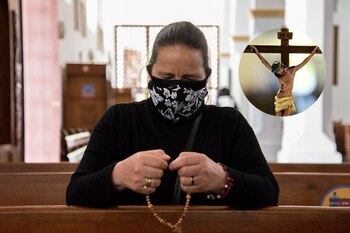
Holy Week has purely religious origins and full of fervour. In the case of the word triduum, it is also linked to religion and especially to Catholic religion and refers to preparation, that is, the ordering prior to the event or event special or desired.
For example, within the religious field, we understand that before the feast and worship of a saint, people must prepare themselves days in advance (three to be exact). The preparation can also be in a spiritual and mental way.
TRIDUO PASCUAL
The specific meaning of the paschal triduum is the three days of preparation prior to the feast of Easter. These are understood by Thursday, Friday and Saturday of Holy Week because let us remember that Sunday is the day on which Jesus was resurrected, according to the Catholic Church. In the case of the Bible, it indicates that Christ was resurrected on the third day, but it does not specify the day as such.
OTHER MEANING OF PASCUAL TRIDUUM
In the case of the new calendar, and in the liturgical norms for Holy Week, the approach is different. The triduum is a new beginning of the liturgical year, since it is the day when it is resurrected, that is, it is the day when everything is born again, as well as opportunities, since life was restored.
After that, it is understood that the duration of the triduum is extended. This unification of the paschal celebration is more in keeping with the spirit of the New Testament and with the early Christian tradition.
Christ himself, when he alluded to his passion and death, never dissociated them from his resurrection. In the Gospel of Wednesday of the second week of Lent (Mt 20:17-28) he speaks of them together: “They will condemn him to death and hand him over to the Gentiles to mock him, flog and crucify him, and on the third day he will rise again”.
The bishop of Milan, in one of his writings, refers to the three holy days (triduum illud sacrum) as the three days in which he suffered, was in the tomb and rose again, the three days he referred to when he said: “Destroy this temple and in three days I will rebuild it.”
Saint Augustine, in one of his letters, refers to them as “the three most sacred days of Christ's crucifixion, burial and resurrection”.
Those three days, which begin with the evening mass of Holy Thursday and conclude with the prayer of the eve of Sunday in Easter, they form a unit, should be regarded as such.
EASTER AT HOLY WEEK
In short, Christian Easter essentially consists of a three-day celebration, which comprises the most painful days in body and soul and the brightest facets of Christ.
The different phases of the paschal mystery extend throughout the three days as in a triptych: each of the three paintings illustrates a part of the scene, but in the end all together they form a single fact. Each picture is in itself complete, but it must be seen in relation to the other two.
Friday, like Holy Saturday, is not officially part of Lent. According to the new calendar, Lent begins on Ash Wednesday and ends on Holy Thursday, excluding Mass from the Lord's Supper. Friday and Saturday of Holy Week are not the last two days of Lent, but the first two days of the “holy triduum”.
KEEP READING
Últimas Noticias
Debanhi Escobar: they secured the motel where she was found lifeless in a cistern
Members of the Specialized Prosecutor's Office in Nuevo León secured the Nueva Castilla Motel as part of the investigations into the case

The oldest person in the world died at the age of 119
Kane Tanaka lived in Japan. She was born six months earlier than George Orwell, the same year that the Wright brothers first flew, and Marie Curie became the first woman to win a Nobel Prize

Macabre find in CDMX: they left a body bagged and tied in a taxi
The body was left in the back seats of the car. It was covered with black bags and tied with industrial tape
The eagles of America will face Manchester City in a duel of legends. Here are the details
The top Mexican football champion will play a match with Pep Guardiola's squad in the Lone Star Cup

Why is it good to bring dogs out to know the world when they are puppies
A so-called protection against the spread of diseases threatens the integral development of dogs




